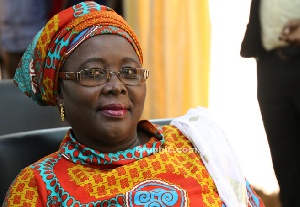 Minister for Local Government and Rural Development, Hajia Alima Mahama
Minister for Local Government and Rural Development, Hajia Alima Mahama
Hajia Alima Mahama, the Minister of Local Government and Rural Development (MLGRD) has commended the Urban Think Tank of Ghana for their support in providing good policy recommendations and strategies for the improvement of urban development in Ghana.
She said urbanisation was one of the most significant processes affecting human development and settlements, especially in the 21st century, which called for action and the need to harness the transformative potentials of urbanisation in its various facets to facilitate the reduction of economic and social challenges for sustainable development and resilient cities.
Hajia Mahama said this in a speech read on her behalf by the Head, Urban/Rural Development Unit (Principal Planning Officer), Mr Inusah at the third gathering of the Urban Think Tank Group of Ghana in Accra.
The Group was instituted to support the processes of urban development management in Ghana through dialogue, knowledge sharing and a commitment to developing strategies for improving urban development management.
She noted that challenges of urbanisation like urban mobility were manifested as traffic jams and poor road infrastructure; poor sanitation had public implications, increasing housing deficit which is as a result of rural-urban migration; development of slums and uncontrolled urban sprawl.
The Minister who is also the Member of Parliament for Nalerigu/Gambaga said the collaboration between Coalition for Urban Transition with the MLGRD would provide experts guidance and advice to stakeholders on urbanisation policies and interventions that are essential for national development.
According to the minister, urban development issues gained traction after the 2010 population and housing census of Ghana, which revealed that Ghana urbanised at 52 per cent and projected to increase to 65 per cent in 2030.
This phenomenon she said should be seen as an essential catalyst for transformational development if government plan appropriately.
Hajia Mahama said the Ministry’s efforts to address issues of urbanisation and capitalise on its potentials led to the development and launch of the Ghana National Urban Policy and Action Plan in 2012.
She said the objectives of the Policy was to facilitate balanced redistribution of urban development; to ensure effective planning and management of urban growth and sprawl, especially of the primary cities and other large urban centres.
Professor George Owusu Isser, Chairman of the Urban Think Tank said, the group will depend on policymakers to consider the recommendations made in the deliberations and ensure that they find space to put them in practice.
He said the Think Tank would ensure that their recommendations will not be put and left on paper, but expect that they were implemented to reflect on the ground.
“A number of documents are being developed and we expect that the final report will detail out certain policy recommendations, which will be implemented by policy makers.
Mr Anton Cartwright, an Economist from the Africa Centre for Cities, a partner Organisation of the Urban Management Institute of the Urban Think Tank said, the work of the Think Tank was to ensure that the urbanisation process which was on-going in Ghana delivered development and economic growth outcome.
He said most African countries were urbanising without development and that this must change for the socio-economic development of the country.
Mr. Cartwright expressed his believe in the Ghanaian economy and how it can help in addressing the country’s urbanisation challenges if the necessary policies are put in place.
“The Ghanaian economy is growing very fast, and the country is urbanising very fast. But the two processes are not at the moment linked together to support or reinforced each other. Ghana has an excellent national policy, which is already five years, and the country National Urban Policy leads in the continent”.
He said the real challenge of re-discovering urbanisation problem was on how to implement the policy and that the Urban Think Tank will ensure that the implementation is done through some of their recommendations.